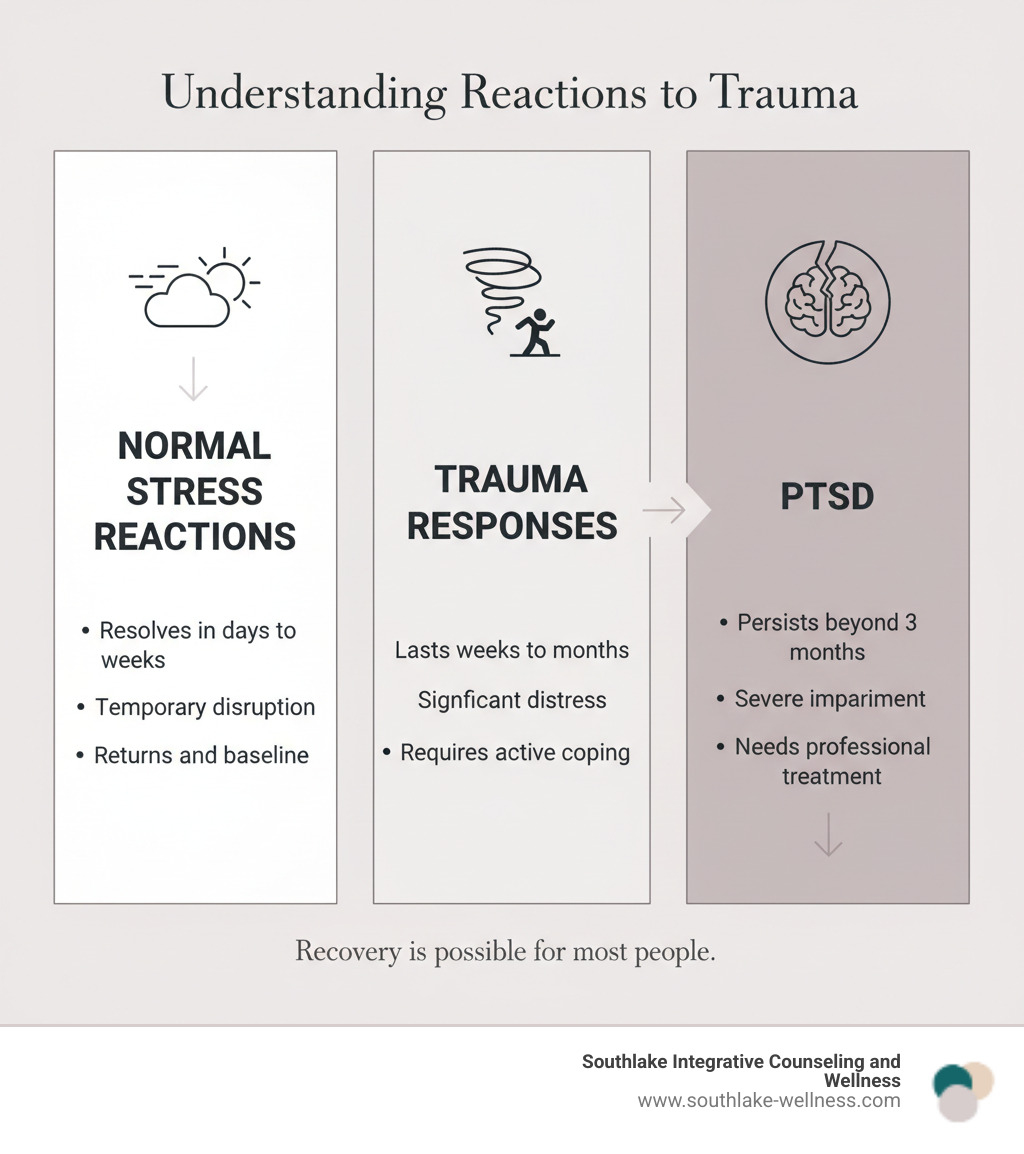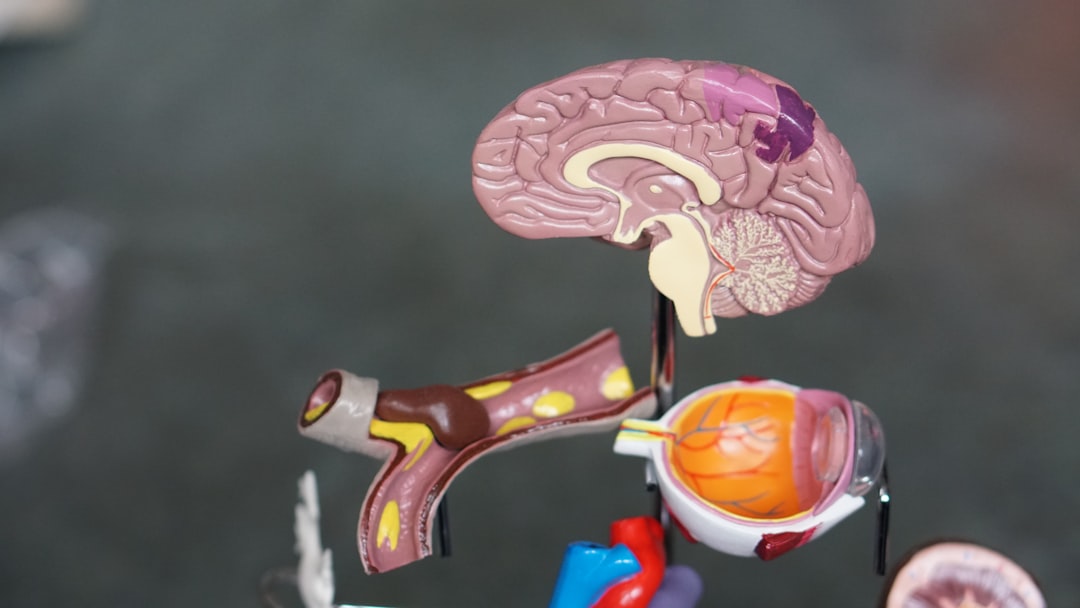
Why Emotional Trauma Deserves Your Attention
Heal emotional trauma is not about erasing the past—it's about learning to live in the present without being overwhelmed by what happened before. If you're searching for ways to move forward after a distressing experience, here's what you need to know:
Quick Steps to Begin Healing:
- Recognize that your reactions are normal - Most people experience strong emotional, physical, and behavioral responses after trauma
- Re-establish safety - Focus on creating stable routines and a sense of security in your daily life
- Practice self-regulation - Use breathing exercises, grounding techniques, and mindful movement to calm your nervous system
- Seek connection - Talk to trusted friends, family, or a professional therapist
- Take care of your body - Prioritize sleep, nutrition, and exercise while avoiding substances
- Consider professional help - If symptoms persist beyond 3-4 weeks or worsen, reach out to a trauma specialist
Trauma is deeply personal. It's not defined by the event itself but by how you experienced it. What overwhelms one person might not affect another the same way—and that's completely valid. The good news? Recovery is possible for most people. Your reactions are normal responses to abnormal events, and healing is within reach.
About one-third of adults have experienced at least one traumatic event in their lifetime. Whether you witnessed something frightening, experienced a serious accident, survived abuse, or went through a natural disaster, your mind and body responded the way they were designed to—by trying to protect you. Sometimes, though, that protective response gets stuck, and the healing process needs some extra support.
I'm Holly Gedwed, a Licensed Professional Counselor Associate with 14 years of clinical experience specializing in trauma treatment. I've helped countless individuals heal emotional trauma through evidence-based approaches that honor the deep connection between mind and body. Let me walk you through the practical steps that can help you reclaim your life.

Understanding Trauma's Footprint: How It Affects Your Mind and Body
Your body's ancient alarm system, the fight-flight-freeze response, is designed to save your life. The problem is that after a traumatic event, this alarm can get stuck in the "on" position. This is nervous system dysregulation, and it's why healing requires more than just positive thinking.

Trauma measurably changes your brain. The amygdala (alarm center) becomes overactive, the hippocampus (memory organizer) can shrink, and the prefrontal cortex (decision-making center) becomes less active. This is why trauma gets "trapped" in the body, showing up as physical tension, chronic pain, or a persistent feeling of being unsafe. Understanding this mind-body connection is essential for healing. You can learn more about the biological impact through resources like Understanding the Impact of Trauma.
Common Emotional and Psychological Reactions
These are normal responses to an abnormal situation:
- Shock and denial: Feeling numb or like you're watching things from behind glass.
- Fear and anxiety: Constant worry about safety, with small things feeling threatening.
- Anger and irritability: Intense, surprising anger directed at others or yourself.
- Guilt and shame: Replaying the event, blaming yourself, or feeling ashamed of your reactions.
- Sadness and hopelessness: Grieving for what was lost, including your sense of safety.
- Feeling disconnected or numb: Detaching from your body, feelings, or people around you.
- Difficulty concentrating: Your brain is working overtime, leaving little energy for focus.
Physical and Behavioral Symptoms of Trauma
Your body remembers and reacts, even when your mind tries to move on:
- Fatigue and exhaustion: Feeling wired and tired from being on high alert 24/7.
- Sleep disturbances and nightmares: Inability to rest due to insomnia or disturbing dreams.
- Being easily startled: An overactive alarm system causing a full-body jolt to small triggers.
- Aches, pains, and muscle tension: Chronic headaches, stomach issues, or back pain from stored stress.
- Social withdrawal: Isolating yourself because it feels safer than connecting with others.
- Avoidance of reminders: Changing your life to escape triggers that bring the trauma back.
- Substance use: Using alcohol or drugs to cope, which can worsen symptoms over time.

The First Steps on Your Healing Journey: Foundational Coping Strategies
After trauma, your nervous system can feel stuck in alarm mode. The first step in healing is to gently recalibrate it by re-establishing a sense of safety in your own body. This foundation makes everything else possible.
At Southlake Integrative Counseling and Wellness, we use an integrated approach to heal emotional trauma from the ground up. By combining therapeutic techniques with body-centered practices, we help you work with your whole self. For more on this, explore our Holistic Stress Management Techniques guide.
Regulate Your Nervous System
Learning to shift your nervous system from alarm back to calm is a vital skill. Here are some techniques:
- Mindful breathing: Deliberately slow your breathing to send a calming signal to your brain. Try inhaling for four counts, holding for four, and exhaling for six. The longer exhale activates your body's relaxation response.
- Grounding techniques: Anchor yourself in the present moment when you feel overwhelmed. Try the "5-4-3-2-1" method (naming 5 things you see, 4 you touch, etc.) or simply feel your feet on the floor and your body in the chair.
- Engaging your senses: Use your senses as a direct pathway to calm. Light a scented candle, hold a smooth stone, listen to soothing music, or wrap yourself in a soft blanket.
- Rhythmic movement: Help discharge stored physical tension through activities like walking, swimming, or dancing. Pay attention to the sensation of your body moving.
For more support, check out our guide on Emotional Regulation Therapy.
Self-Care as a Cornerstone to Heal Emotional Trauma
Self-care isn't a luxury; it's about giving your body the basic resources it needs to heal.
- Sleep: Aim for 7-9 hours a night. Your brain processes emotions and memories while you sleep. A consistent, calming bedtime routine can help retrain your body to rest.
- Nutrition: Fuel your brain with balanced meals rich in omega-3 fatty acids (fish, walnuts) to support mood regulation. Avoid the temptation of comfort foods that can leave you feeling worse.
- Avoid substances: Alcohol and drugs interfere with your brain's natural healing process and can worsen trauma symptoms over time.
- Routines: Predictable daily schedules for meals, work, and sleep are incredibly soothing to a nervous system on high alert.
- Boundaries: Protect your energy by saying no to commitments or limiting time with certain people or media. This isn't selfish—it's essential for recovery.
Incorporate small, nurturing activities daily, like spending time in nature, journaling, or connecting with trusted friends. These are the building blocks that gradually shift your nervous system from survival mode back to living.
Professional Pathways to Heal Emotional Trauma
When self-help isn't enough, a trauma specialist can provide a safe container to process difficult memories without becoming overwhelmed. At Southlake Integrative Counseling and Wellness, we use a phased approach: first building safety, then processing the trauma, and finally reconnecting with life. Our philosophy integrates Evidence-Based Therapy Techniques with alternative modalities for a personalized plan.

Cognitive and Talk-Based Therapies
These therapies help you sort through the mental clutter left by trauma, reshaping unhelpful thought patterns.
Trauma-Focused Cognitive Behavioral Therapy (TF-CBT) is a highly effective approach that helps you understand the connection between your thoughts, feelings, and behaviors. You'll work with a therapist to process traumatic memories in a structured way, challenging negative beliefs like "It was my fault" and developing a coherent life story that isn't defined by the trauma. Learn more about our approach on our Cognitive Behavioral Therapy page.
Somatic and Body-Based Approaches to Heal Emotional Trauma
Your body remembers trauma physically, which is why body-based therapies are so powerful for helping you heal emotional trauma.
- Somatic Experiencing (SE) guides you to notice physical sensations, allowing you to gently release "trapped" trauma energy from your body. This can lead to a profound release of chronic tension and a renewed sense of safety in your own skin.
- Eye Movement Desensitization and Reprocessing (EMDR) is a gold-standard treatment that uses bilateral stimulation (like eye movements) to help the brain process and "digest" traumatic memories. It can resolve the stuck "fight, flight, or freeze" response, often without requiring you to talk about the trauma in detail.
- Trauma-informed yoga is specifically designed for survivors to help regain a sense of control over the body and improve self-regulation. It fosters self-compassion and helps you learn to tolerate overwhelming emotions.
At Southlake Integrative Counseling and Wellness, these somatic approaches are central to our philosophy. Learn more from our Information on Somatic Therapy.
Integrative and Parts-Work Therapies
These therapies help bring harmony to the different internal "parts" of you that may hold pieces of the trauma story.
- Internal Family Systems (IFS) views your inner world as a "family" of parts, each with a protective role. IFS helps you access your core "Self"—a source of wisdom and compassion—to lead your internal system toward healing.
- Emotionally Focused Therapy (EFT), especially Emotion-Focused Therapy for Trauma (EFTT), is helpful for trauma involving relationships. It creates a safe space to process emotions that were too overwhelming to handle alone, modeling a path toward healthier connections.
These integrative approaches reflect our commitment to custom treatment. If anxiety is a major concern, you may find support in our Anxiety Therapy Southlake services.
When Trauma Lingers: Recognizing PTSD and Knowing When to Seek Help
While most people naturally recover from trauma symptoms within a few weeks or months, sometimes the healing process gets stuck. If your symptoms persist or intensify, you might be experiencing Post-Traumatic Stress Disorder (PTSD).
With PTSD, your body's alarm system stays on high alert long after the danger has passed, leaving you in a state of psychological shock. This isn't a sign of weakness; it's a real condition where your brain and body are struggling to exit survival mode. When this happens, it can significantly impact your work, relationships, and ability to enjoy life. Our Trauma Therapy Southlake services offer specialized support to help you heal emotional trauma that has become deeply entrenched.
Key Signs You May Need Professional Support
Reaching out for help is an act of courage. Consider seeking professional support if you experience the following:
- Your symptoms have lasted for months or are getting worse.
- You're experiencing severe and debilitating fear, anxiety, or depression.
- Connecting with others feels impossible, leading to isolation.
- Terrifying memories or flashbacks intrude on your daily life.
- You avoid more and more situations, causing your world to shrink.
- You feel emotionally numb or disconnected from your life and loved ones.
- You're struggling with work or daily responsibilities and may be relying on substances to cope.
Understanding Post-Traumatic Stress Disorder (PTSD)
PTSD is a mental health condition that can develop after a terrifying event. It is not a sign of weakness. A diagnosis requires that symptoms last for more than a month and cause significant distress. Professionals look at four main symptom categories:
- Re-experiencing symptoms: Unwanted intrusive thoughts, vivid flashbacks, and nightmares that make you feel like you're reliving the event.
- Avoidance symptoms: Actively staying away from people, places, thoughts, or feelings connected to the trauma.
- Arousal and reactivity symptoms: Being easily startled, feeling constantly on guard, having difficulty sleeping, and experiencing irritability or angry outbursts.
- Cognition and mood symptoms: Negative beliefs about yourself or the world, persistent feelings of fear, guilt, or shame, loss of interest in activities, and an inability to feel positive emotions.
While therapy is the primary treatment, medication can sometimes play a supporting role. You can learn more about Medications for PTSD as one piece of the puzzle. With the right support, people with PTSD can and do recover.
Supporting the Circle: Healing in Community and Relationships
Healing from trauma is rarely a solo journey. Social connection is essential for recovery, reminding your nervous system that you are safe and not alone. While the instinct may be to isolate, research shows that being around caring people significantly improves mental health outcomes.

How to Support a Friend or Family Member
If someone you love is working to heal emotional trauma, your caring presence matters more than having the perfect words. Here’s how you can help:
- Be patient and understanding. Recovery isn't linear. Avoid comparisons or telling them to "get over it." Acknowledge that their journey is unique.
- Offer practical support. Help with groceries, childcare, or chores can be more valuable than a conversation. Ask, "What's one thing I could do to make your life easier?"
- Listen without trying to fix things. If they want to talk, your job is to bear witness, not to offer solutions. Just be present.
- Don't pressure them to share. Let them know you're available, but also happy to just sit with them in silence or do a quiet activity together.
- Help them stay connected. Gently encourage them to join you for a walk or a meal, but don't push. Companionship itself is healing.
- Don't take symptoms personally. Irritability or withdrawal is about their struggling nervous system, not you. Avoid giving unsolicited advice.
Trauma in Children and Adolescents
Children and teens often express trauma through behavior rather than words.
- Younger children (under 6) may regress (e.g., bedwetting), become clingy, or act out the event during play. This is their way of processing.
- Older children and teenagers may show adult-like symptoms but can also become disruptive, develop intense guilt, withdraw from friends, or engage in risky behaviors.
- Regression is normal across all ages. A child acting younger is seeking comfort and safety.
For any child, the most important factor for healing is a safe, predictable environment with consistent routines and loving support. They need to know the adults in their life are stable and can keep them safe.
Frequently Asked Questions about Healing Emotional Trauma
When you're searching for ways to heal emotional trauma, it's normal to have questions. Here are some clear, direct answers to common concerns.
How long does it take to recover from trauma?
There is no simple timeline, as healing is different for everyone. For many, symptoms fade over a few weeks to months. However, recovery is not linear; there will be good days and bad days. The goal is an improved daily quality of life, where you can live in the present without being overwhelmed by the past. Focus on progress, not perfection.
Can you heal from trauma without therapy?
Self-help strategies like grounding, exercise, and social support are crucial, and some people recover with these tools alone. However, professional guidance is often necessary for deep-seated or complex trauma. A therapist provides a safe environment and specialized tools (like those on our Cognitive Behavioral Therapy page) to work through places where you feel stuck. If symptoms persist or interfere with your life, reaching out is a sign of strength.
What is the difference between trauma and complex trauma (C-PTSD)?
This is an important distinction. Trauma often refers to a single, acute event (like an accident or assault). Complex trauma (C-PTSD) results from prolonged, repeated exposure to traumatic events, often in childhood or relationships where escape was not possible (e.g., ongoing abuse or neglect).
While PTSD affects one's sense of safety, C-PTSD deeply shapes one's entire sense of self, relationships, and emotional regulation. Symptoms include those of PTSD plus additional challenges like chronic shame, difficulty with trust, and a fragmented sense of identity. Treatment for C-PTSD, such as IFS or EFT, often requires a more in-depth approach.
No matter what you're facing, healing is possible and you deserve support.
Conclusion: Reclaiming Your Life and Embracing a New Future
Healing from trauma isn't just about getting back to "normal." It's about finding something profound within yourself—a resilience you didn't know you had. When you heal emotional trauma, you're not erasing your past or pretending it didn't happen. You're learning to carry it differently, integrating those experiences into your story without letting them write your future.
Many people who do this work find what researchers call post-traumatic growth. This isn't just bouncing back; it's actually moving forward in ways you might not have imagined. You might find yourself with a deeper appreciation for the small moments, stronger relationships, or a clearer sense of what truly matters to you. The trauma becomes part of your history, yes, but not the defining chapter of your life.
This journey takes courage. Some days will feel easier than others, and that's completely okay. What matters is that you're moving toward a future where you feel more present, more connected, and more yourself. You're reclaiming your life, one step at a time.
At Southlake Integrative Counseling and Wellness, we walk alongside you on this path. Our holistic mental healthcare approach honors the deep connection between your mind and body, recognizing that healing happens on multiple levels. We combine evidence-based therapies with alternative modalities to create personalized treatment plans that actually fit your life, your needs, and your unique experience. Whether you're dealing with recent trauma or working through something that's affected you for years, we're here to support you with compassion and expertise.
If you're ready to take that next step—or even if you're just curious about what healing might look like for you—we'd be honored to help. Begin your healing journey with Accelerated Resolution Therapy, a powerful approach that can help you process traumatic memories without having to relive them in detail. Or simply reach out to learn more about how our integrative approach can support your path to wellness.
Your story isn't over. In fact, some of the most meaningful chapters might be yet to come.